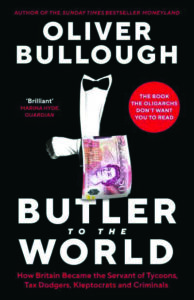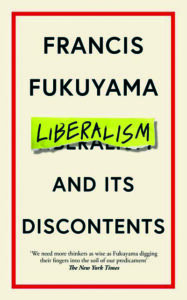

When the Dust Settles
by Lucy Easthope
Hodder & Stoughton, 304pp, £20
Lucy Easthope is a “disaster expert” whose skills – practical and pastoral – are sought in the wake of all kinds of mass suffering, from tsunami to terrorist attack to the Grenfell Tower fire. Her sensitive and profoundly moral book explores how human beings can preserve their resilience and live with loss.

Butler to the World
by Oliver Bullough
Profile, 288pp, £20
Oliver Bullough’s urgent and deeply reported book shows how the long project to establish a new “Global Britain” from the ashes of the empire created a multi-trillion-dollar offshore economy – and allowed the UK’s political and professional elites to prop up murderous regimes such as that of Vladimir Putin.

Dancing on Bones: History and Power in China, Russia and North Korea
by Katie Stallard
OUP, 320pp, £22.99
The NS China editor combines reportage and analysis in this account of how three leaders manipulate history to bolster authoritarian rule. A timely, intelligent work about the politics of memory, myth and national storytelling.

The Car
by Bryan Appleyard
Weidenfeld & Nicolson, 320pp, £22
If any one object defined the 20th century, says Bryan Appleyard, it was the motor car – it conferred freedom, shaped the look of cities, and opened up the countryside, even as it also brought death and pollution. Its days are now numbered and there is a wistful edge to Appleyard’s history of – sometimes paean to – the automobile and its impact.

A Life of Picasso IV: The Minotaur Years, 1933-43
by John Richardson
Jonathan Cape, 320pp, £35
After a 15-year wait, it seemed as if volume four of John Richardson’s life of Picasso – one of the great biographical enterprises of our times – might never arrive. It has, however, and describes a febrile period in Picasso’s life, as full of lovers (Marie-Thérèse Walter, Dora Maar, Françoise Gilot) as war and the painting of Guernica.

Disorder: Hard Times in the 21st Century
by Helen Thompson
OUP, 384pp, £20
Helen Thompson’s book stands tallest among the recent titles that attempt to make sense of our age of crises. Disorder is a singular work owing to the skill with which Thompson, a Cambridge academic and NS columnist, maps the intersecting relationships between energy, global monetary policy, and the state of liberal democracy.
[See also: The 1990s promised a new era of peace, but it was an illusion from the start]

Pure Colour
by Sheila Heti
Harvill Secker, 224pp, £16.99
The Canadian author’s latest book is a philosophical inquiry into grief that takes the form of a novel set in God’s second draft of the world. Its array of whimsical characters includes Mira who, overcome after the death of her father, reincarnates into a leaf with him. Heti’s work is always original – that Pure Colour is also deeply moving makes it all the more remarkable.

Liberalism and its Discontents
by Francis Fukuyama
Profile, 178pp, £16.99
The author of The End of History and the Last Man once again establishes a defence of liberalism, while also describing how it is being eroded from within by both the right and left. Read against the backdrop of the Ukraine war, it serves as a warning. As Fukuyama writes, paraphrasing Churchill, “Liberalism is the worst form of government, except for all the others.”
[See also: Our 12 favourite children’s books]

Bitch: A Revolutionary Guide to Sex, Evolution and the Female Animal
by Lucy Cooke
Doubleday, 400pp, £20
Why do duck vaginas twist like corkscrews? What percentage of albatross couples are lesbians? Why does Darwin fail to explain female promiscuity? And why have scientists ignored these questions for so long? Zoologist Lucy Cooke’s hilarious and enlightening book reclaims evolutionary biology for females of all species.

Cold Enough for Snow
by Jessica Au
Fitzcarraldo, 104pp, £9.99
The unnamed narrator of Jessica Au’s prize-winning second novel travels to Japan on holiday with her mother. As they visit the sights, Au deftly depicts a relationship so totally lacking intimacy or any sense of mutual understanding that it begins to feel unreal. Slippery and stirring, this is an affecting exploration into what it really means to know another person.

The Stasi Poetry Circle
by Philip Oltermann
Faber & Faber, 224pp, £14.99
The GDR, described by one of its founders as a “literature society”, became a state ruled by its secret police – but the two strands combined in the 1980s when the Stasi formed a poetry writing class. Philip Oltermann offers a fascinating account of the eccentric characters who took part in this flawed mission to make verse a weapon of ideological war.

Soundings: Journeys in the Company of Whales
by Doreen Cunningham
Virago, 320pp, £18.99
With her two-year-old son, Cunningham follows the 10,000-mile migration route of the grey whale from the lagoons of Mexico to the Arctic Ocean. A beautiful account of trauma, community and nature’s capacity to heal, her book takes its place alongside modern classics of the genre such as Helen Macdonald’s H is for Hawk.

Homesickness
by Colin Barrett
Jonathan Cape, 224pp, £14.99
A vigilante shooting on a farm; a samurai sword unsheathed in a bar; a failing poet buying cannabis from his schoolgirl dealer: Barrett’s scenes are full of humour and small-town Irish colour, but his great skill is opening them up into existential questions and emotional truths. His brilliant second collection confirms him as one of the very best short-story writers in the business.

Invisible Child
by Andrea Elliott
Hutchinson Heinemann, 624pp, £16.99
The journalist Andrea Elliott tells the story of a tight-knit black family from New York who are being unpicked by poverty, drug addiction, bureaucratic indifference and racism, and their efforts to weave themselves back together. This is non-fiction writing at its best – uncluttered, well-researched and evocative, it reveals a system that is rigged.
[See also: The 14 best books to help you understand Putin’s Russia]

East Side Voices
edited by Helena Lee
Sceptre, 224pp, £14.99
This collection celebrating the east and south-east Asian diaspora in Britain features poetry by Mary Jean Chan and personal essays from Tash Aw and Gemma Chan. The work praises the nuances of heritage while skewering the narrow-mindedness of racial stereotyping, offering a powerful corrective to the anti-Asian racism brought by the Covid-19 pandemic.
This article appears in the 27 Apr 2022 issue of the New Statesman, Sturgeon's Nuclear Dilemma





